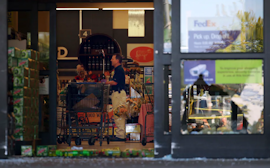|
Grocery Stores Under Fire - Making the Headlines
Grocery workers have borne the brunt of the pandemic. Now supermarket shootings
are on the rise.
 According
to data from the Federal Bureau of Investigation, shootings at grocery stores
have risen in recent years. Between 2000 and 2020,
78 people were killed
in 28 such incidents,
FBI data shows. According
to data from the Federal Bureau of Investigation, shootings at grocery stores
have risen in recent years. Between 2000 and 2020,
78 people were killed
in 28 such incidents,
FBI data shows.
While some of the shootings were at smaller markets or convenience stores in gas
stations, major chains such as
Walmart and Kroger have
experienced multiple shootings at their locations since 2018.
Earlier this year, a
gunman killed 10 people
at a King Soopers outlet, owned by Kroger, in Boulder, Colo.
For grocery workers,
the threat of violence
adds to a growing list of hazards they have faced during the pandemic, from an
increased risk of coronavirus infection
to belligerent customers refusing to wear masks.
When a shooting like the one on Thursday at Kroger occurs,
grocery workers “can’t
help but identify with it,”
said Wright. “At a certain point, these
cumulative stressors
start to take a toll on your coping ability.”
For Kroger in particular, it has been a devastating year. In March, an
employee opened fire at
one of the company’s
distribution centers in Wisconsin, killing two
of his colleagues before turning the gun on himself. Just
five days later, a
gunman stormed into the Kroger-owned store in Boulder. The dead included three
Kroger employees, six customers and a police officer.
“Nothing can prepare
you for this kind of situation,”
said Tim Massa, a senior vice president at Kroger, during a
panel on workplace violence
organized earlier this summer by a food industry group. “So many feelings wash
over you —
you’re fearful, you’re
angry, you’re feeling the pain and importantly, just helplessness.”
Massa described how Kroger consulted experts on trauma and resiliency, held a
companywide moment of reflection for the victims and urged all managers to
create space for employees to discuss their feelings, reinforcing that “it’s
okay not to be okay,” he said.
&uuid=(email))
Kroger also required all its employees to complete a refresher course on what to
do in an active-shooter situation to “ensure that everyone had a fresh recall of
how they can protect themselves at work and also out in the community,” said
Massa.
Last Thursday,
a gunman entered a
Kroger store in the Memphis
suburb of Collierville and began shooting. Employees rushed to hide in freezers
and offices while trying to help gravely injured colleagues. One customer was
killed, as was the gunman, who turned the weapon on himself.
The wounded included 10
employees and five customers,
said Kristal Howard, a Kroger spokeswoman. The company is
helping store employees
with pay and counseling services,
she said. The suspect has been identified as a “third-party
vendor,” said Howard.
Lonnie E. Sheppard Jr., the president of the local chapter of the United Food
and Commercial Workers International Union (UFCW), said that
supermarkets are
clearly targets for violence
and corporations must do more to protect their workers. “People need to go to
work knowing they are safe,” he said.
Grocery stores have been a
recurrent setting for
this kind of violence
in part because they are open from early morning until late at night, they cater
to a broad demographic range which occasionally results in interpersonal
friction, and,
even in the pandemic,
they have been one of the few retail environments that were consistently open,
says William Flynn, co-founder of the Power of Preparedness, a security training
company, who formerly worked for the New York Police Department and the
Department of Homeland Security.
Two years ago, Walmart and Kroger responded to a spate of deadly shootings
by asking their customers not to display weapons
in stores located in states that permit the open carrying of firearms. In
response,
some gun rights advocates called for a boycott
of the stores.
By the grim standards of American mass shootings, Thursday’s incident at the
Kroger store in Tennessee barely registered — and some grocery workers elsewhere
in the country said they weren’t even aware of it.
Other grocery workers, such as Safeway’s Chavez, were hyper-aware of the
shooting. He’s a member of the executive board for the local chapter of the
union representing grocery workers. In March, he drove to the site of the
shooting in Boulder to pay his respects. He says that the
union is advocating for
armed guards in stores,
and that the deadly violence in Tennessee makes that priority even more urgent.
“We’re putting our lives on the line all the time with coronavirus and now with
all these mass shootings,” Chavez said. Employees and customers alike feel
vulnerable, he said. “Like
me, they’re thinking, ‘Hey, are we next?’”
washingtonpost.com
|